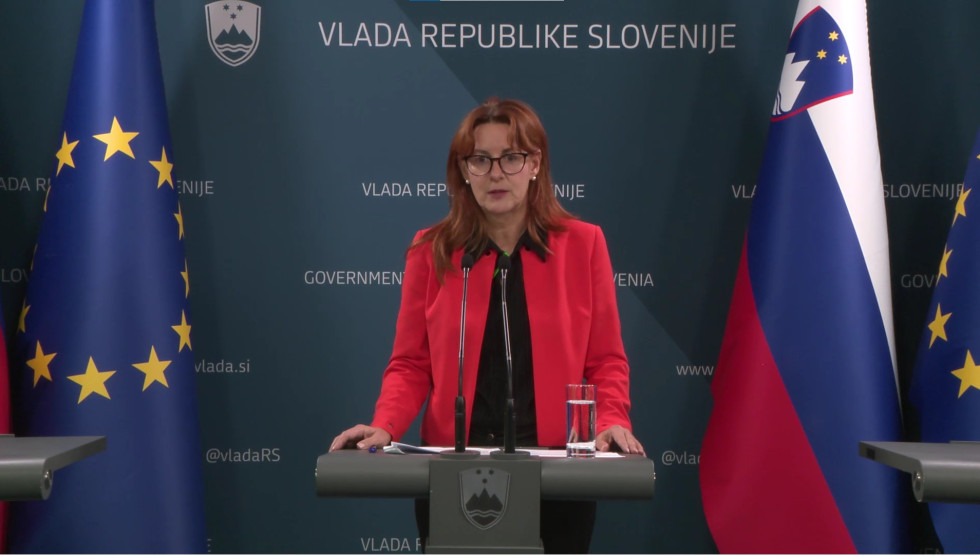124th regular session of the Government of the Republic of Slovenia
At today's session, the Government issued a Decree on determining intensified security conditions due to staffing or accommodation problems in prisons and on taking provisional measures and published it in the Official Gazette of the Republic of Slovenia. Pursuant to paragraph three of Article 10b of the Enforcement of Criminal Sanctions Act (ZIKS-1), the Government of the Republic of Slovenia shall, by an ordinance to be published in the Official Gazette of the Republic of Slovenia, establish intensified security conditions due to staffing or accommodation problems in prisons and shall determine the type and manner of implementation of one or more temporary measures and the duration of their validity in such a way that, in light of staffing or accommodation problems in prisons, they are necessary, appropriate and proportionate for protecting the life and health of people under guard and the protection of their human rights and fundamental freedoms, and to ensure smooth work in prisons. On the initiative of the Director-General of the Prison Administration of the Republic of Slovenia, the minister responsible for justice proposed that the Government take temporary measures for the performance of the duties and tasks of a judicial police officer by a member of the Administration staff who has previously held the post of judicial police officer and to suspend a prison sentence. As at 30 September 2024, prisons were, on average, overcrowded by as much as 140.34%: the Ljubljana Prison by 187.41%, the Dob Pri Mirni Prison by 142.31%, the Koper Prison by 159.43%, the Ig Prison by 97.96% and the Celje Juvenile and Adult Prison by 165.98%. On 30 September 2024, the proportion of prisoners held in protective custody per judicial police officer reached an average of 3,526. This means that, in accordance with indent ten of Article 10 of the ZIKS-1, intensified security conditions exist for both legally defined criteria. The current situation requires provisional measures to be taken, such as the performance of the duties and tasks of a judicial police officer by a member of the Administration staff who has previously held the post of judicial police officer (Article 10c of the ZIKS-1) and suspension of a prison sentence (Article 10č of the ZIKS-1).
The government adopted the Medium-term Fiscal-Structural Plan of the Republic of Slovenia 2025–2028, which determines the growth of net general government sector expenditures. This requires an adjustment of the three-year fiscal framework. To this end, the Government also approved a proposal for amending the Decree on the framework for the preparation of general government sector budgets for the period 2025–2027. The Medium-term Fiscal-Structural Plan was made on the basis of the new EU fiscal rules. It will replace the Stability Programme and the National Reform Programme that each EU Member State has been required to prepare so far. The plan envisages a four-year fiscal adjustment, which, in the medium term, will ensure maintenance of the general government sector deficit below 3% of gross domestic product (GDP) and a reduction of the share of general government sector debt in GDP to the 60 percent of GDP limit. The average growth of net general government sector expenditures in the period 2025–2028 is set at 4.5% and represents a key variable in monitoring fiscal policy’s compliance with fiscal rules and a fixed limit for conducting fiscal policy in the period under consideration. In this way, a predictable and stable fiscal path is determined, which will ensure adequate fiscal effort in the medium term and will be consistent with the European Commission's previous guideline for Slovenia, where not only annual but also cumulative compliance with the set fiscal limits will be important for subsequent monitoring actions. In addition to the planned fiscal policy, the plan also includes key reforms and investments in response to specific recommendations in the framework of the European Semester (the annual process of coordinating economic and fiscal policies at EU level) and other EU priorities.
The Government also took note of the starting points for drafting the proposal for an act on protection measures for persons engaged in public activities. These starting points are based on the EU Directive on strategic lawsuits against public participation of 11 April 2024, which must be transposed into national law by 7 May 2026. Examples of strategic lawsuits against public participation (SLAPP lawsuits) are a form of abuse of legal remedies, as the purpose of these lawsuits is not to assert rights in court proceedings, but rather to intimidate defendants and limit freedom of expression, as well as prevent or limit critical public debate, which consequently weakens democracy. SLAPP lawsuits impose upon the defendant a huge financial and temporal burden, and they also affect other people, namely persons against whom such suits are not directed. SLAPP lawsuits are usually directed against journalists, media, non-governmental organisations; however, these are not the only targets of these lawsuits, as they also be directed against scientists, academics, etc. These lawsuits may also be filed against natural persons and private-law legal persons.
The starting points provide for a wider scope of application of the new Act than requirements by the aforementioned Directive. This Act would apply not only to cross-border cases, but also to exclusively national cases. It is envisaged that, in the framework of public debate and professional coordination, the Ministry of Justice will also examine the appropriateness of measures in criminal proceedings conducted against the aforementioned persons for crimes against honour and reputation. According to the Directive, the Member States are required to adopt these rules in civil court proceedings only.


